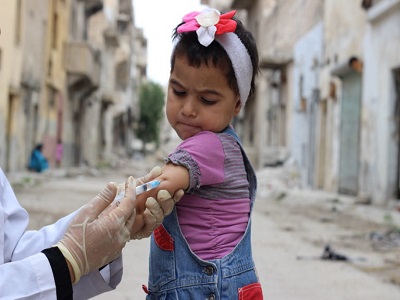©UNICEF/Syria/2017/Aleppo/Al-Issa
Globally, many countries are facing a broad range of humanitarian emergencies resulting from various hazards, which differ in scale, complexity and consequences. Emergencies may lead to major and possibly continuous disruption of vaccination services provided through primary health care, resulting in a significant drop in vaccination coverage. This may lead to a decrease in population immunity, and increased morbidity and mortality from vaccine-preventable diseases with potential risks for outbreaks. Vaccination should be among the high-priority health interventions implemented to limit the avoidable morbidity and mortality due to Vaccine Preventable diseases. Maintaining or re-establishing routine vaccination services should be the primary objective of every national immunization programme during humanitarian emergencies.
Learning objectives
The objectives of this online resource are to facilitate:
- the understanding and encourage the use of two documents: Vaccination in Humanitarian Emergencies: An Implementation Guide; and Vaccination in Acute Humanitarian Emergencies: A Framework for Decision Making;
- provides guidance to decision makers and health workers in charge of planning and managing routine or additional vaccination service delivery in a humanitarian emergency context; and
- show the importance of being responsible and proactive when faced with such emergency situations.
After completing these modules, participants will be able to:
- define an acute humanitarian emergency,
- describe the roles and responsibilities of key partners and stakeholders in emergency responses related to immunization,
- access and use the decision-making framework for vaccination in humanitarian emergencies online tool and its complementary resources,
- list the steps and key considerations in planning and implementing a vaccination response in an emergency setting, and
- access complementary resources on emergency vaccination.
Audience
The guides, etool and elearning are intended to provide a methodology and tools to immunization programme managers for vaccination during humanitarian emergencies. The intended audience for the package includes UNICEF and WHO staff, government and partner agencies who are expected to work together to reach a decision regarding the need and strategies of implementing one or more vaccines in a given humanitarian emergency.
It is recommended that immunization and emergency staff include the Vaccination during Humanitarian Emergencies eLearning course as part of their professional development plan. Discuss with your supervisor to include this training curriculum as part of your 2018 goals.
Length
It should take 2 - 2.5 hours to complete this course. Each module should take 25-35 minutes to complete. After completing the first module, participants will have access to the other modules, and may follow the modules in whichever order they would like.
Methodology
Learning materials, including a field guide and four elearning modules, are organized in chronological order, using a concept of project management to support the process of decision making during emergencies, planning, implementation and monitoring of immunization activities during humanitarian emergency situations.
Structure
This elearning program consists of an introduction and four modules with integrated assessment questions. The modules focus on the following:
Module 1
Provides general definition of humanitarian emergency as well as acute emergencies. It includes knowledge on the Immunization Task Force (ITF), Operation Control Room, and considerations on how ITF interacts with the Health Cluster, subnational levels, and NITAG.
Module 2:
The aim of this module is to help the user to thoughtfully, deliberately, ethically, and rationally determine if the delivery of one or more vaccines to specific target populations during the acute phase of an emergency would result in an overall saving of lives, a reduction in the population burden of disease, and generally more favourable outcomes than would otherwise be the case.
The topics include:
- the purpose and scope of the framework,
- an overview of each decision-making step,
- documentation and research recommendations, and
- a presentation of the online tool.
Module 3
This module covers how to take decision on use of vaccines; planning for vaccination services; and implementing vaccination services in a humanitarian emergency situations.
The topics include
- Assessing the immunization programme
- Integrating of vaccination service delivery with other services
- Planning at the macro and micro levels
- Mobilizing resources and managing vaccine supplies
- Demand-related and community-based interventions
- How to secure access
- Strategies for vaccination service delivery for specific contexts
Module 4
This module summarizes the process of monitoring, evaluating and supervising vaccination activities in emergency situations. It also provides recommendations on how to conduct a proper exit strategy once the emergency situation improves.
The topics include
- data reporting,
- monitoring,
- information sharing and dissemination
- exit strategy,
- case studies to facilitate better assimilate this content.
Module 5
- Evaluation
Certificate
A certificate is available following the successful completion of all five modules.
Contact details
For questions or feedback on this course, please contact:
- Jhilmil Bahl, Capacity building officer at WHO: bahlj@who.int
- Melanie Marti, Technical Officer WHO: martim@who.int
- Imran Mirza, Health Specialist at Unicef: imirza@unicef.org
